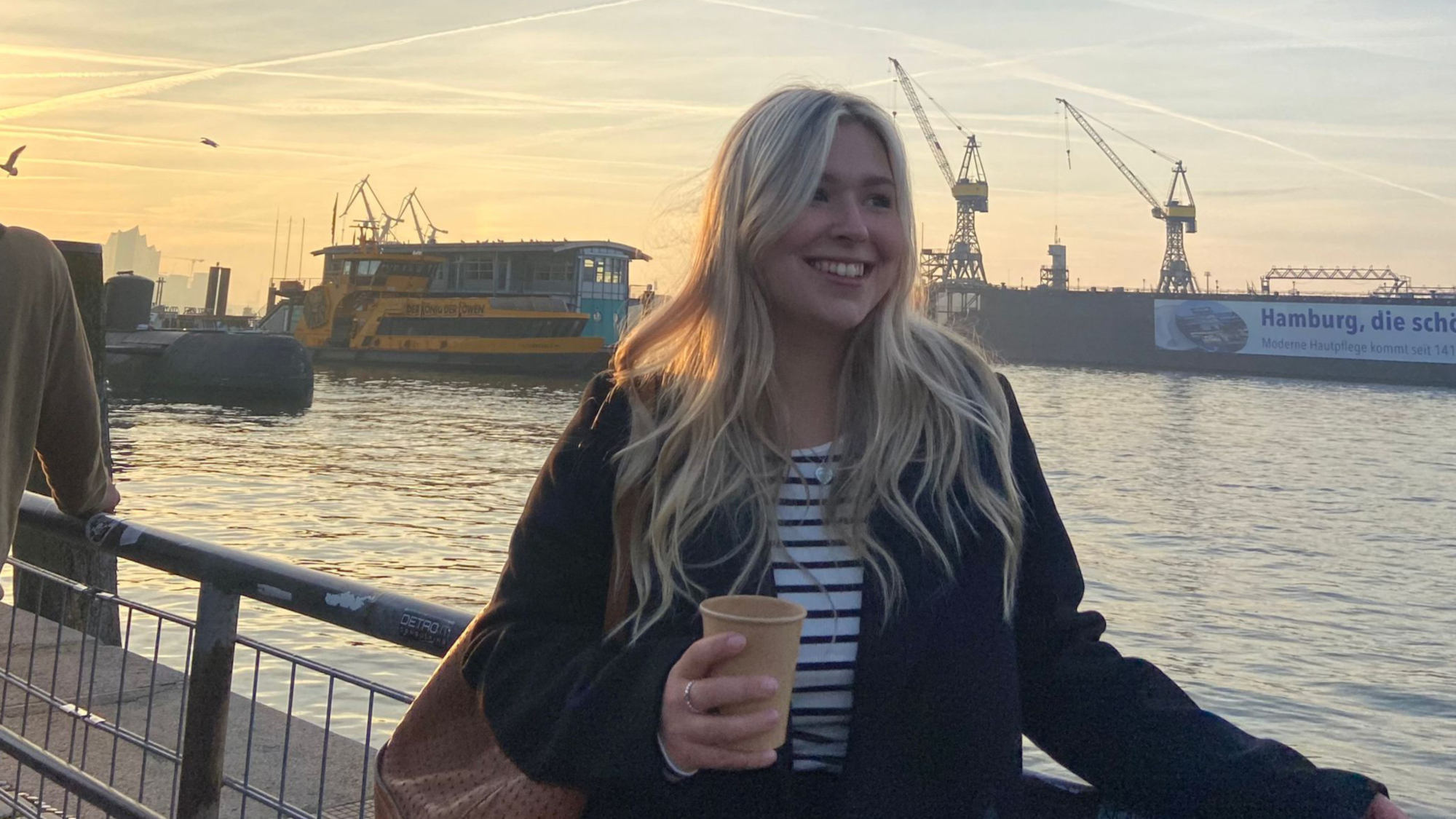
© Privat
A Day in the Life of Student Emily
Emily is in her third semester and is taking up2date. along for a typical day at the University of Bremen
Emily is 21 years old and is studying Public Health as a single major subject. After graduating from high school, she first worked as a receptionist in a physiotherapy practice and then traveled to Paris as an au pair, among other things, before starting her studies at the University of Bremen in the 2022/23 winter semester. up2date. accompanied her on a Thursday during the lecture period.
08:00 a.m.
The day starts early. Emily has to leave a little earlier than usual to get to her Epidemiology II lecture. It is held in the lecture hall on Grazer Straße, where Faculty 11: Human and Health Sciences.is located. To get there, she gets off tram number 6 at the stop “Berufsbildungswerk” and walks the rest of the way. When she arrives at the lecture hall, fellow student Lena is already there. The two of them usually arrange to meet at the window on the left-hand side so that they can sit together during the lecture.
08:15 a.m.
The lecture starts at quarter past eight. Why? It’s because of the “academic quarter,” which refers to the 15 minutes before and after the specified time. Classes do not run from 08:00 to 10:00 a.m., but from 08:15 to 09:45 a.m. You can always recognize this by the “c.t.” written after the time, which means “Cum Tempore.” This is Latin and means “with time.”
The Epidemiology II lecture is about how and why diseases spread. Today, the calculation of new disease rates is being discussed.
09:45 a.m.
The first lecture is over! As the sun is shining today, we take a short walk to the university. However, if the weather is too bad, Emily and Lena prefer to take bus 22 towards Kattenturm to get to the Central Campus Area.
10:00 a.m.
Once they arrive at the GW2 cafeteria, Emily and Lena have a cappuccino with oat milk. They think it’s the best coffee on campus. Afterwards, they use their free period to work together on the assignment for their upcoming seminar: Management in Healthcare I – Case Study Seminar. For each unit, they have to work on and prepare various case studies on the topic of management in the healthcare sector. Today, the case study is about implementing liquidity accounting.
11:30 a.m.
Emily’s friend Shelly joins them and they make their way to the Mensa cafeteria together. How lucky that it’s just opening! “We won’t be able to make it to the Mensa cafeteria after our next seminar. We have to walk back to Grazer Straße in the half hour between classes,” explains Emily.
She has a tip: if there’s nothing to your taste, just ask for a baked potato at the salad bar. “They’re really tasty and only cost 2.50 euros.” She pays for it with the rechargeable Mensa cafeteria card. You can top up your Mensacard on campus in the foyer of the State and University Library Bremen (SuUB), in the Mensa cafeteria, and in the GW2 cafeteria to make cashless payments. The queue for the Mensacard tills is usually shorter than the one for cash.
In the Mensa cafeteria, the three of them like to sit in the upstairs area. “It’s usually less crowded there and we often get seats by the window,” says Emily.
12:15 a.m.
After lunch, it’s off to GW2 Building for an epidemiology seminar. This is the seminar that accompanies the lecture Emily attended this morning. As the seminars usually start a week later than the lectures, the content from last week is being discussed today. “The seminars give you the opportunity to address unanswered questions from the lecture,” says Emily.
13:45 a.m.
Now it’s time to leave promptly so that we’re back at Grazer Straße in time for the next seminar. It’s a lot of walking, but fresh air between classes is really good,” says Emily.
14:15 a.m.
Back at Grazer Straße, it’s time for the case study seminar. Emily and her fellow student Lena worked on the case study for today’s session during their free period. The case study will be discussed during the seminar and they can check if they did everything right.
The seminar covers topics such as internal and external accounting, marketing, and process optimization. “I particularly like the fact that the degree program is so interdisciplinary thanks to seminars like this one,” says Emily.
15:45 a.m.
Done! There are no more classes on Emily’s timetable today. “If I am having a day where I feel particularly motivated, I go to the library and study or go through the lectures,” she says. She finds going to the SuUB after classes particularly useful during the exam phase. On the one hand, because she can concentrate better in a quiet learning environment, and on the other, to save time. Emily lives in the Neustadt district, which can sometimes take half an hour with the tram. That’s why she often decides to revise the material at home during the semester.
18:00 a.m.
So, enough studying for today. After a long day at university, Emily meets up with friends at a bar in the neighborhood where her boyfriend works. “As it’s Thursday and I don’t have any classes on Fridays, it’s a good way to round off the day.”